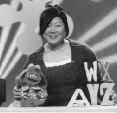NOTORIOUS C.H.O.
Paramount Theatre, 911 Pine, 323-0750, $27.50-$37.50 4 p.m. and 7 p.m. Sun., Nov. 11
IF SOMEONE CAN tell a superior joke about using her finger to stimulate an endless act of fellatio, I guess I just dumbly don’t want her to worry too much about the Meaning of It All. Which is why when comedian Margaret Cho used the word “compassion” twice during our recent phone interview, said she hoped someday to be perceived as an educator, and described her current show, Notorious C.H.O., in terms of body image, some superficial part of me sort of slumped inside and thought: Oh, no, not really? Cho’s last outing, the hilarious I’m the One That I Want—source of the aforementioned dirty digit reference—stopped cold every time she tried to explain her sociopolitical personal transformations. (Can’t anyone just be raunchy anymore and let us do the thinking about the cultural significance?) Cho is a performer in transition, and her two shows in Seattle—which are being filmed for future theatrical release—may be the test of whether she can successfully get serious with her funny business.
Seattle Weekly: What’s your show about?
Margaret Cho: The show is about the idea that we can be OK within our own bodies: the body observed as opposed to the body inhabited. It’s a really physical show—not like a dance show or anything, but it’s physical in that it’s referencing the bodily experience in a lot of ways. So it’s very sexually explicit, it’s very explicit emotionally, it’s explicit all around. It’s a lot about body dissatisfaction—how to get over it, and how to get through it, and how I did.
Is it a continuation of the issues you were talking about in I’m the One That I Want?
The beginning of the discussion starts [there], and it continues in Notorious C.H.O. I think I’m the One That I Want is more of a coming-of-age show, where this show is more of a call to action.
Do you think that comedy can still be shocking?
I hope that it can be, and I hope that I get to be. I’m not really shocked by what I do, but I know that people have been.
Do you think consciously about the possible discomfort of an audience? Do you think, “Oh, this is gonna get ’em?”
I have a lot of compassion for audiences, and their discomfort is not really my goal. I don’t want people to be squirming.
How hard is it to be funny after Sept. 11? How much of a concern is that for you?
I want to do good work, and I want to alleviate some of the pain that was caused by that terrible, terrible day. There is some part of the show now devoted to talking about what happened.
In a funny way?
In a funny way, yeah. I think that it’s important, because you have to define the way people are going to look at the incident. And to make jokes about it without being insensitive certainly is a challenge.
Is your audience mostly a gay and lesbian crowd these days?
It’s everybody. There was a period where it was very gay and lesbian, and now it’s much more women and feminist. There’s a larger population of women in the audience, generally. It’s grown out to almost the mainstream.
Do you ever find yourself adjusting a show based on the audience response you’re getting?
No, not really, because I don’t care [laughs]. I kind of perform for the same people everywhere I go now, so it’s not a concern of mine.









